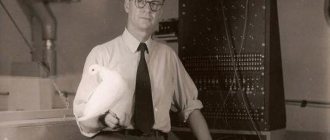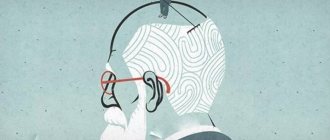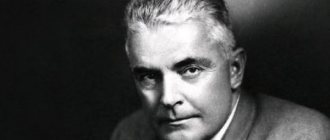B.F. Skinner's neo-behaviorism
Neo-behaviourism is based on the same principle as Watson, namely: psychology has no right to deal with feelings, drives or other subjective states[1]; he rejects any attempt to talk about the “nature” of man, to construct a model of personality, or to analyze the various passions that motivate human behavior. Skinner rejects any analysis of behavior in terms of intent, purpose, or purpose as pre-scientific and a waste of time. Psychology should be concerned with the study of the mechanisms that motivate human behavior and how they can be used to achieve maximum results. “Psychology” according to Skinner is the science of manipulating behavior; its goal is to discover the “stimulation” mechanisms that produce the behavior desired by the “client.”
Instead of the conditioned reflexes of the Pavlovian model, Skinner talks about the stimulus-response model. In other words, this means that unconditioned behavior is welcomed and rewarded because it is desired by the experimenter. (Skinner discovered that praise and reward are stronger and more effective motivators than punishment.) As a result, this behavior is reinforced and becomes a habit for the object of manipulation. For example, Johnny doesn't like spinach, but he eats it anyway, and his mother rewards him for it (praises him, gives him a look, a friendly smile, a favorite piece of cake, etc.), which is a positive "stimulus" according to Skinner. When incentives are applied consistently and systematically, it comes to the point that Johnny begins to like eating spinach. Skinner and his colleagues developed a series of surgical techniques and tested them in hundreds of experiments. Skinner proved that through the correct application of positive "stimuli" it is possible to change the behavior of both animals and humans to an incredible degree - even despite what some have too brazenly called "innate tendencies."
Having proved this experimentally, Skinner undoubtedly received recognition and fame. At the same time, he confirmed the point of view of those American anthropologists who place sociocultural factors in first place in the formation of man. It is important to add, however, that Skinner did not completely reject genetic speculation. However, to accurately characterize his position, the following should be emphasized: Skinner believes that behavior is completely determined by a set of “stimuli” that do not depend on genetic determination. A stimulus can be produced in two ways: either as a result of a normal cultural process, or by a premeditated plan.
Goals and values
Skinner's experiments are not aimed at clarifying the goals of education. During the experiment, conditions are created for the experimental animal or subject so that they behave in a completely certain way. Why they are placed in such conditions is a matter for the project manager, who determines the goals of the study. A practical experimentalist in a laboratory, by and large, cares little about why he teaches, raises or trains an experimental animal (or person); he is more interested in the process of demonstrating his skills and choosing methods that correspond to the goal. When we move from laboratory conditions to the conditions of real life of a person and society, serious difficulties arise specifically related to the questions: why is a person subjected to manipulation, and who is the customer (who sets and pursues such goals)?
It seems that when Skinner talks about culture, he is still talking about his laboratory, where the psychologist operates without regard to value judgments and does not experience difficulties because the purpose of the experiment does not matter to him.
The idea of behaviorism
Stimulus occupies an important niche in behaviorism. It implies a given situation that builds reinforcement for the response. These reactions are represented by the emotional and verbal reactions of the surrounding society. But at the same time, personal experiences do not go unnoticed, but are transferred to a dependent position on external factors.
Scientific researcher John Watson outlined the main points on which behaviorism is built:
The purpose of observing psychology is the behavior and reactions of all living beings. These are the manifestations that will be studied.
All physiological and psychological manifestations come from the type of behavior.
The reaction of people and animals needs to be studied as a single motor indicator to external stimuli - stimuli.
By examining the stimulus indicators, you can predict the next response. The main task of behaviorism is to learn to predict the actions of an individual. In this way, an individual's behavior can be controlled.
All types of human reactions consist of acquired forms (conditioned reflexes) or are inherited (unconditioned reflexes)
A person’s habits are the result of learning. Those. repeated repetition of the response is imprinted in memory. This can subsequently be reproduced. Thus, the formation of skills occurs through the development of conditioned reflexes.
Thinking and speaking are also included in the list of skills.
Memory serves as storage of acquired skills.
The formation of mental reactions occurs throughout life. Such development depends on living conditions, social society and external stimuli.
There is no systematization of age development. There are no common signs in the process of formation of the child’s psyche at different stages of age.
Emotions mean the body's response to positive and negative stimulants of the surrounding space.
Watson assumed that a person could be taught anything. In his opinion, genetic, personality and mental factors will not interfere with learning.
If we go deeper, the essence of behaviorism is the creation of a laboratory of society.
About psychological experiments
When a psychologist sets out to understand human behavior, he must choose methods that are suitable for studying people in real life, whereas behavioral research is practically carried out in vitro. It may seem that psychology is trying to gain respect by imitating the natural sciences, borrowing some of their methods, but it turns out that these were the methods in effect 50 years ago, and not the “scientific” methods used today in the advanced branches of science. As a result, the missing theory is often hidden behind impressive mathematical formulas that have nothing to do with the facts and do nothing to enhance their significance.
Developing a method for observing and analyzing human behavior outside the laboratory is no easy task, but it is a necessary prerequisite for understanding humans. Essentially, there are only two observation methods that work when studying a person:
- The first method is a direct and detailed examination of one person by another. The most effective version of this method is demonstrated by Freud's “psychoanalytic laboratory”. Here the patient is given the opportunity to express his unconscious drives, and at the same time the connection of these drives with observed “normal” and “neurotic” forms of behavior is clarified. A less powerful, but still quite productive method is an interview or a series of questionnaires, to which should be added the study of some dreams, as well as a series of projective tests. Even without knowing the subject personally and without having his letters, diaries or detailed biography, the psychologist can use this type of observation as an important source for understanding the psychological profile of the individual.
- The second method of studying a person in life is, instead of “driving” life into a psychological laboratory, turning certain life situations into a “natural laboratory.” Instead of constructing an artificial social situation (as is done in a psychological laboratory), the researcher studies the experiments that life itself offers. It is necessary to select social situations that can be compared and turn them into an appropriate experiment using a special method. If some factors are taken as constants and others are changed, then in such a natural laboratory it is possible to test various hypotheses. There are a lot of similar situations, and you can test whether a particular hypothesis fits all of these situations - and if not, then you can find out whether there is a convincing explanation for this exception, or whether the hypothesis needs to be changed. The simplest form of such a “natural experiment” is a questionnaire survey (using a large list of open-ended questions or personal interviews) conducted among representative groups of people of different ages and professions.
Theory and main directions of behaviorism
The ideas formulated by behaviorists gave impetus to the development of many directions and applied disciplines.
Here are some directions
:
- Methodological behaviorism
is actually the most classic version, which believes that only the external manifestations of human activity matter, while thoughts and feelings do not influence behavior. - Radical behaviorism
- was developed by Skinner, who believed that internal events in the body, including thoughts and feelings, are no less important than observable behavior. Skinner believed that external stimuli control internal events in the body in the same way that they control external behavior. - Theoretical behaviorism
- also pays attention to thoughts, feelings and other internal processes in the body, which have become possible to observe with the help of modern technologies; but it allows more freedom in the choice of methods for studying and controlling behavior. - Psychological behaviorism
is a direction used in psychology and psychotherapy. It is used in children's education and development, in modern teaching methods, in the study of mental and psychological abnormalities and disorders.
Frustration aggression theory
There are many other behavioral studies of aggression, but the only general theory of aggression and violence is the frustration theory of John Dollard and others, which attempts to explain the cause of all aggression. More specifically, this theory states the following: “The occurrence of aggressive behavior is always associated with the presence of frustration, and vice versa - the presence of frustration always entails one form or another of aggression.”
Two years later, one of the authors of this theory, N.E. Miller formulated the second half of the hypothesis, suggesting that frustration can cause many different reactions and that aggression is only one of them.
According to Bass, with rare exceptions, this theory was accepted by almost all psychologists. Buss himself critically summarizes: “Unfortunately, the exclusive focus on frustration has led to the fact that a whole large class of antecedents (noxious stimuli) has been thrown out along with the concept of aggression as an instrumental response. In fact, frustration is only one of many precursors to aggression, but not the most powerful.”
The original simple formulation of the theory has suffered greatly from numerous interpretations of the term "frustration". The most important are two meanings: 1) the cessation of a goal-oriented activity that has begun (the example of a boy who is hit by his mother when he reaches into the cookie jar) and 2) frustration as refusal, desire, passion, “denial”, according to Bass (the boy who asks his mother for cookies, but she refuses him).
Numerous interpretations of the concept of frustration are explained, firstly, by the fact that Dollard and others did not formulate their ideas clearly and clearly enough. The second reason is probably that in everyday language the word "frustration" is usually used in the second meaning, to which a psychoanalytic interpretation can be added.
Each meaning of the word "frustration" corresponds to two completely different theories. Frustration in the first sense seems to be a rather rare phenomenon, since it presupposes a situation in which conscious activity has already begun. In any case, serious confirmation or refutation of this theory can only be expected from new scientific data in the field of neurophysiology.
As for the other theory, based on the second meaning of the word “frustration,” we have the impression that it does not stand up to the test of empirical facts. People standing in line for theater tickets, believers during Lent, people at war who have to put up with a lack of quality food - these and hundreds of similar cases do not lead to an increase in aggression. Rather, the psychological meaning of frustration plays a decisive role for a person, which can change depending on the environment.









